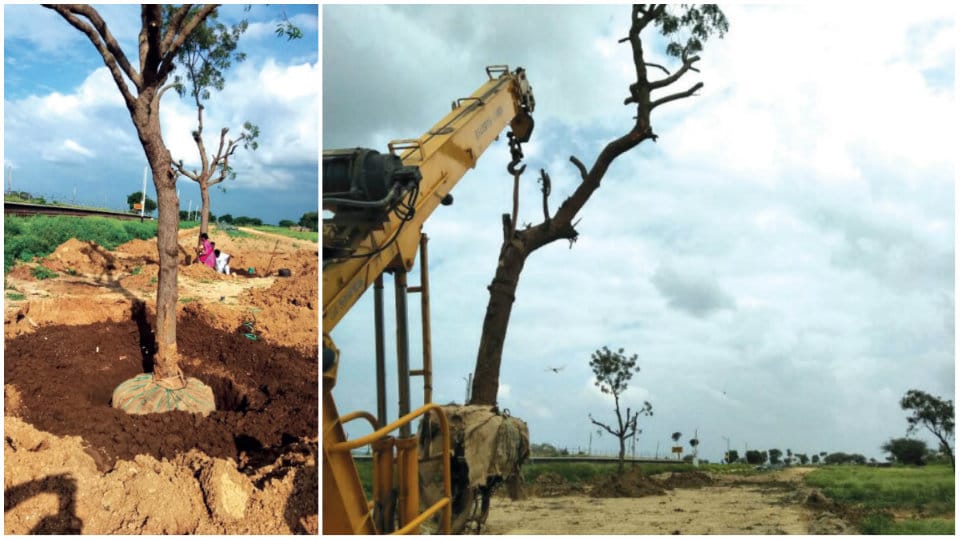Mysuru: In first-of-its-kind initiative, South Western Railway (SWR) zone, which has jurisdiction over Karnataka, Andhra Pradesh, Tamil Nadu, Maharashtra and Goa, has embarked upon a plan to translocate 46 trees, which otherwise would have been felled to make way for track doubling.
Devaragudda is a crossing station at about 369 km from Bengaluru in Bengaluru-Hubballi route. SWR is executing doubling works in Tumakuru-Arsikere (95 km) and Chikjajur-Hubballi (194 km) sections in this route. Devaragudda is a two line station in Mysuru Division and on account of doubling, this station is to be developed into four-line crossing station.
In the initiative that began early this week at Devaragudda in Ranebennur taluk of Haveri district where the track doubling work on Chikkjajur-Hubballi line is to be taken up, the translocation of 25 trees was completed by Friday (Oct. 13) evening.
The project is because of the initiative taken by Chief Engineer Manoj Tiwari who came up with the idea of translocating the trees instead of felling them. Subsequently, the Railways got a few experts from Hyderabad to carry out the work and among them one agency was hired to carry out the translocation as per standard procedure, Alokkan Padmanabhan, Executive Engineer of Construction Wing of SWR, said in a press release.
These 46 trees located adjacent to the Devaragudda railway station comprise a variety of species, including Nemalinare, Neem, Delbargia, Sisso, Pumgamia, Albizzia and Lebbeck, having girths in the range of 60 cm to 290 cm. Chief Engineer of Construction Alok Tiwari, Deputy Chief Engineer Sharfuddin, Junior Engineer Ramesh are involved in the supervision work.
Keeping in view the vision of Indian Railways, ‘to promote green environment and green energy while making the Indian Railways a global leader in sustainable mass transports’, it was decided to translocate the trees. This is a small beginning in SWR for saving the trees and protecting the environment, the release said.
Green Morning Horticulture Pvt. Ltd., which has been entrusted with the work, shifted 10 trees on the first day and five on the second. On Friday, workers have completed translocation of 10 trees and on Saturday, they have translocated 10 more, Padmanabhan said.
Of the 46 trees identified for translocation, 30 are fairly young while the rest are bigger trees measuring up to 15-20 meters. Since the translocation of bigger trees requires bigger crane and shifting of the utilities in the station yard, the work is likely to consume time and the plan is to complete the work by end of next week, Padmanabhan added.
The work was done under supervision of horticulture experts who have transplanted many trees in past at various places. The process involved uprooting the trees with surrounding soil after duly protecting the roots, shifting to new location using crane, transplantation to required depth and further providing manure and fertilisers, pesticides, etc. After completion of transplantation work, regular watering is to be done for 6 months and horticulture experts have to visit to see the growth of transplanted trees.








Recent Comments